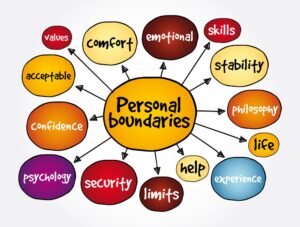 Personal boundaries are essential for a variety of reasons. They act as safeguards for your self-esteem.
Personal boundaries are essential for a variety of reasons. They act as safeguards for your self-esteem.
They can also set boundaries with people and communicate that they will not tolerate certain behavior.
Those who lack personal boundaries frequently find themselves in less-than-ideal settings and relationships.
Without boundaries, you are at the mercy of the people around you.
Respecting oneself and demanding respect from others is important to personal boundaries.
Use the following guidelines to set healthy personal boundaries:
1. Be Proud of Yourself. You have the authority to define your own boundaries.
Few people will treat you better than you deserve, so take charge of your own health.
Unfortunately, no one else will be responsible for your well-being.
2. Define Who You Are. Determine who you are, what you want to be, and how you should be treated.
- What will you tolerate from others?
- What are you unwilling to accept any longer?
If you don’t define yourself, the rest of the world will. And you’re not going to like it.
3. Make Yourself a Priority. Others are significant, but they are not more significant than you.
 You will be in a better position to care for others if you first take care of yourself.
You will be in a better position to care for others if you first take care of yourself.
Running oneself ragged for the sake of others is not beneficial to anyone.
If you take care of yourself, you will be a better parent, spouse, and employee.
4. Where do You Need Boundaries in Your Life? Perhaps you should quit volunteering on Saturdays or stop suffering emotional abuse from your lover.
Maybe you’re just too eager to lend money to folks who never repay you.
You get what you are willing to tolerate in life.
What will you no longer put up with?
5. Establish Hard and Distinct Boundaries. Make your boundaries realistic while also making them known to others.
Misinterpretation or miscommunication is less likely if others know where you stand on particular subjects.
It is possible to have overly stringent boundaries.
If you live alone and are too self-sufficient, you may have overly stringent personal boundaries.
6. Be Adaptable. You are not required to observe a rule 100% of the time.
 Determine who and what you want to let in and who and what you want to keep out.
Determine who and what you want to let in and who and what you want to keep out.
According to studies, those who have some flexibility in their own boundaries have the optimum combination of happiness and achievement.
Being too rigorous can be as damaging as being too slack.
7. Learn to Say No When Necessary. Boundaries define what you will accept from others.
Avoid succumbing to the need to make everyone else happy.
Healthy limits and a healthy dose of selfishness go hand in hand.
Today, try saying “no” to someone. The world is not going to end.
8. Be Open in Your Communication. It is your responsibility to notify anyone who crosses your boundaries.
Often, this is as simple as declining a request.
In some cases, you may be needed to provide additional explanation.
If you don’t provide input, others won’t be able to give you what you desire.
Take Care of Yourself by Establishing Boundaries!
Setting boundaries is an exercise in self-care and respect. You can expect people to treat you with respect and concern.
If your lack of personal boundaries is causing you problems, it’s time to start taking better care of yourself.
Adequate boundaries are beneficial not only to your self-esteem and general mental health but also to all parts of your life.
You also improve your ability to care for your friends and family.






